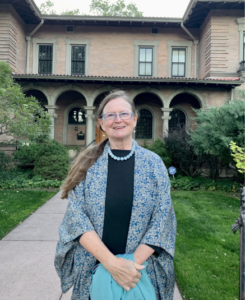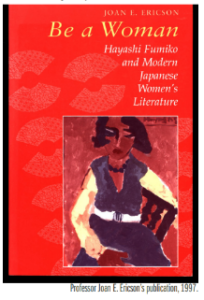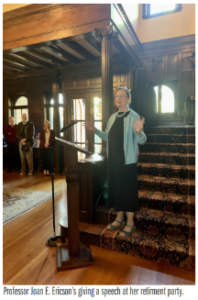by Esa Chen ‘25

A Luminary in Japanese and Asian Studies
For over three decades, the hallways and classrooms of Colorado College have echoed the profound influence of a singular name in Japanese and Asian Studies: Professor Joan Ericson. Students also call her Joan Sensei (which means “teacher” in Japanese). Since her arrival in 1996, she has meticulously shaped the college’s approach to Asian Studies, carving a distinctive niche in Colorado College’s academic landscape.
Raised in Japan, Prof. Ericson’s intimate bond with Japanese language, culture, and literature has not only marked her personal journey but also forms the backbone of Colorado College’s transformative journey in Asian Studies. She is celebrated for both her vast knowledge and her visionary approach to the inception of the Japanese program and a comprehensive Asian Studies Program. Now, as Professor Ericson steps into retirement, it is a moment of reflection for Colorado College, as we reminisce on the profound impact she has had on the institution’s academic fabric.
The Evolution of Asian Studies with Professor Ericson at the Helm
During its nascent phase at Colorado College, the academic focus predominantly lay on Western culture and history, with no dedicated program for Asian Studies. The turning point came with a generous donation from Edith Gaylord Harper (also known as Edith Kinney Gaylord). Inspired by her contribution and seeing the need for a deeper exploration of Asia’s vast cultural, historical, and socio-political landscape, Prof. Ericson, in collaboration with Prof. Hong Jiang of the Chinese department, initiated the Asian Studies program. The journey wasn’t without challenges; Prof. Ericson and Prof. Jiang were pioneers in this domain at Colorado College, meaning they often had to chart their own course without the benefit of an existing framework or precedents. Whether it was grappling with a limited pool of experts on Asian topics, addressing logistical constraints, or making decisions on course offerings, they were frequently in uncharted territory. When they envisioned initiatives like study abroad programs, they took it upon themselves to contact potential partners, organize all logistics, and even petition the college for necessary funding. Prof. Ericson’s leadership and collaborative spirit turned the challenges they faced into opportunities, and her proactive approach and commitment laid the foundation for the program’s eventual success.
With Prof. Ericson’s vision as its guiding star, the Asian Studies program has flourished, evolving from a modest entity to a thriving academic community. Beyond just expanding the course listings, Prof. Ericson built a communal ecosystem where faculty members from various departments converged on their different expertise, leading to a comprehensive and holistic program. Her innovative initiatives, like the First-Year Experience (FYE) course with a language component, not only enriched the curriculum but also drew students to the major. She encouraged students to venture out, study abroad, and immerse themselves in the culture and language. Many returned with renewed vigor, keen on delving deeper into their studies.
Literary Insights and Engagements

Navigating Japan’s literary history, from the Tokugawa period (1603 – 1867) to the contemporary era, Prof. Ericson has unveiled the intricate dance between societal norms, gender dynamics, and the literary canvas of Japan. With an interest in the development of women’s literature, Prof. Ericson delved deep into the multifaceted landscape . Her publication “Be a Woman: Hayashi Fumiko and Modern Japanese Women’s Literature” stands out in her collection of work. In it, she highlights the nuanced intersection of gender and genre in literature, challenging the stereotypical conceptions surrounding women writers like Hayashi Fumiko. Inspired by Hayashi Fumiko’s children’s literature, Prof. Ericson’s interests extend beyond modern literary classics, but also to children’s literature—a focus she intends to pursue in her research post-retirement.
Her research continues. After her retirement, even though she is no longer teaching, she is keen on delving into two major projects. The first revolves around the journey of a Japanese international student, Taizo Nakashima, at Colorado College in 1893. This student, originating from the Japanese countryside, learned English and was educated in a Christian school in Osaka before arriving at Colorado College. Prof. Ericson is intrigued by his unique trajectory, especially given that many during that time traveled to the U.S. for work rather than education. To reveal the untold stories of Taizo, Prof. Ericson would like to go to Japan again and visit his hometown to talk to the successors of his family in the neighborhood.
Her second project is a comparative study of Japanese children’s literature. She aims to juxtapose children’s literature from the Tokugawa period, where education became increasingly prevalent, against post-1945 literature, which was the time when Japan was reconstructing its educational materials after the war. During the Tokugawa period, education became common due to city development and the establishment of temple schools. Consequently, there was a need for better materials for children’s education, leading to the creation of some of the earliest manga and paving the way for children’s literature. , there was a shift in Japanese educational content. Much of the available and existing literature was imbued with patriotic sentiments from the wartime era, which wasn’t ideal for children’s education. This necessitated the creation and sourcing of new educational materials tailored specifically for children.
The Essence of Experiential Learning with Professor Ericson
Outside the confines of lectures and textbooks, Prof. Ericson also championed immersive learning. She doesn’t merely preach about immersive experiences; she embodies them. Her recollections of enriching trips with students to Japan highlight the breadth of her hands-on approach: from crafting traditional sweets in Fujiyoshida (Colorado Springs’ sister city), to visiting Taro Tomisawa’s farm in the mountains in order to gain an understanding of village life and food production. Through her passion and commitment, she not only taught students about Japanese culture but genuinely immersed them in it, forging memories that will resonate for years to come.
Never one to be hemmed in by campus boundaries, Prof. Ericson relentlessly pursued opportunities to extend education for students beyond traditional settings. Her unwavering commitment saw the establishment of pivotal CC exchange programs with Japan. These programs, though confronted with initial challenges, enabled students to savor the diverse landscapes of Japan – from the dynamic cityscape of Tokyo to the historic architecture and traditional canals of Omi Hachiman.
At the core of Prof. Ericson’s educational philosophy lies a fervent belief in tangible, immersive learning. She initiated a series of study abroad endeavors, starting with a summer course in Japan. As time passed, her vision broadened, leading to collaborations with esteemed institutions such as Waseda University and Kansai Gaidai University. Through her relentless efforts and secured funding, bachelor’s degree candidates from diverse disciplines ventured to Japan, undertaking groundbreaking projects. From examining sports injuries among female soccer players across the U.S. and Japan, to pioneering phonetic studies aimed at aiding English speakers in mastering challenging hiragana pronunciations, her students’ endeavors were varied and impactful.
Furthermore, her commitment to academic growth and cooperation has not solely been student focused. Prof. Ericson also orchestrated educational tours for faculty to esteemed universities across Asia, spanning countries from China, to Korea, to Japan, and to Indonesia. These tours not only nurtured global academic relationships but also birthed reciprocal exchange programs. As a result, professors from these partner institutions enriched Colorado College with their expertise and vice versa.
Prof. Ericson believes that hands-on experience is crucial and emphasizes the importance of having an open mind to understand worlds beyond the US. She hopes that after participating in these projects, students will be inspired to further explore Japanese culture and language. Despite the challenges of independently organizing numerous programs and courses, she finds the process rewarding. In her words, “One idea sparks another, forming a chain of inspiration.” Prof. Ericson derives an unparalleled sense of fulfillment from organizing these programs and bringing them to life. She is of the belief that to achieve any goal, one must first set it and then diligently plan towards its realization.
A Legacy Beyond the Classroom

Throughout her tenure, Prof. Ericson has remained committed to her students, guiding them not just in academic pursuits but also in their personal journeys. Her endeavors have left an indelible mark, creating ripples that extend far beyond the confines of Colorado College. Her teachings, dedication, and mentorship will resonate for generations to come.
To Prof. Ericson, every educational endeavor, every student project, and every international collaboration is a meticulously crafted link in a vast chain of learning. Each experience begets another, continuously evolving and expanding in scope. Her pride in these programs isn’t just about the numbers or accolades but the profound sense of achievement she feels in witnessing the meticulous planning of each initiative come to glorious fruition. In her world, the journey is just as significant as the destination, and she has ensured that her students and colleagues travel that journey in its most enlightening, fulfilling, rewarding, and comprehensive manner.
As she embarks on her retirement, the Colorado College community extends its heartfelt gratitude. Professor Joan Ericson’s legacy is a testament to her enduring passion, commitment, and vision. As she turns her page to the next chapter, her contributions will continue to inspire, educate, and shape minds at Colorado College and beyond.